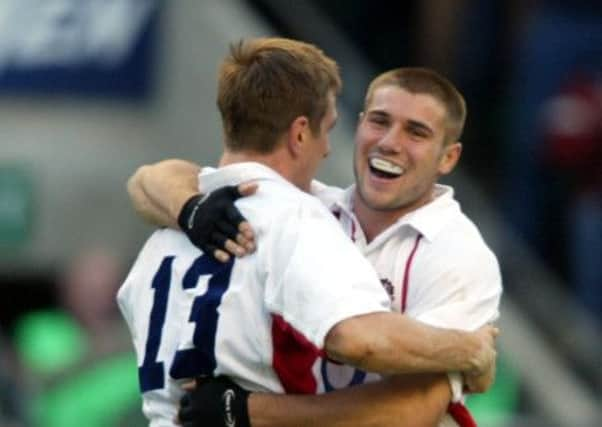Victory over the Springboks can point way to world domination


The regular November fixtures with the best three teams from the southern hemisphere take on greater significance, and in the eternal search for hope it is hard not to draw parallels to this very month 12 years ago.
The England back then of Martin Johnson, Jonny Wilkinson, Neil Back et al were at the start of their inexorable march to the top of the world.
Advertisement
Hide AdAdvertisement
Hide AdOn three successive Saturdays in the penultimate month of 2002, Clive Woodward’s England defeated New Zealand, Australia and South Africa.
Two months later, they won the Six Nations grand slam, having lost just one game in each of the previous four years to miss out on the clean sweep.
Then, in the summer, England went to Wellington and Melbourne, beating the All Blacks and the Wallabies in their own backyards – on such victories are legends forged – before returning Down Under in the autumn to complete the job by marching to World Cup glory.
In all, they won every match from November 9, 2002, to that never-to-be-forgotten evening of November 22, 2003; 18 games in total.
Advertisement
Hide AdAdvertisement
Hide AdIt is a sequence looked upon now as the perfect build-up to the zenith of English rugby.
Many feel without the run in the year before the World Cup, when they beat everyone in sight, England might not have enjoyed their finest moment in the Telstra Stadium, when Wilkinson kicked that team into English sporting lore.
As the fixtures tick down to the start of next year’s global gathering, right here in our own rugby stadiums and sporting cathedrals, it is hard not to start joining the dots again.
England have missed out on a Six Nations grand slam over the last four years by one game every time, just as had the class of 2003.
Advertisement
Hide AdAdvertisement
Hide AdIn the forthcoming 2015 tournament, three of their five games are at home, making them favourites again to not only lift the title, but clinch a first grand slam since that dominant one 12 years ago.
They have built steadily through the last three years, accelerating at times with era-defining wins over New Zealand and Australia, and vengeful victories against those foes closer to home, such as Wales.
Bumps in the road have been encountered, as all developing teams suffer, but by and large, they have learned from those and applied those lessons wisely.
Granted, they were unable on Saturday to match the 31-28 victory England managed on the opening weekend of the November series 12 years ago, when the All Blacks were sent packing from Twickenham.
Advertisement
Hide AdAdvertisement
Hide AdBut in mitigation, the New Zealand of 2002 were good, but they were not sporting greats, a team for the ages as this all-conquering All Black vintage has become.
Furthermore, Stuart Lancaster’s England are ravaged by injuries.
If there is a positive, it is that young players are being blooded at the highest level, but Lancaster would have hoped to be tinkering in the middle years of the World Cup cycle, not in the final push.
This enforced examination of England’s strength in depth may well prove to be an advantage come next autumn, and one we might recall in a few years – with rose-tinted glasses perched on the end of our noses – as crucial on the journey to world glory.
Advertisement
Hide AdAdvertisement
Hide AdBecause although the timeframe is different, it offers up another parallel to that great run of 2002-03.
Will Greenwood, who played in 17 of those 18 wins including the World Cup final, traces the start of that team’s run back to prior to the previous autumn.
“Weirdly enough, it goes back to the summer before for us in that we sent a second-string team to Argentina and they won a series over there which we hadn’t done before,” said Greenwood.
“Suddenly, every one of us who was down for a ‘rest’ that summer thought ‘bloody hell, there’s all sorts of people coming for our slots’ and, therefore, competition became ferocious.
Advertisement
Hide AdAdvertisement
Hide Ad“We came back for the autumn and got off to a flying start with a great win over New Zealand in an epic.
“We then turned over South Africa by an absolute hatful (53-3).
“It got us going and led us into a grand slam.”
It is that Springboks game this coming Saturday that Greenwood views as England’s biggest this month, because they are the only team Lancaster’s men have yet to beat.
“We could lose every game, just beat South Africa,” was the essence of Greenwood’s interview in The Yorkshire Post recently.
Why? “Because belief is everything in sport,” he said.
Advertisement
Hide AdAdvertisement
Hide Ad“We were not the best individuals in the world, but we turned ourselves into the best team in the world.
“To stand in a changing room on World Cup final night, knowing that whatever came at us we’d faced down and were ready for, is a huge part of the winning process.”
It is a process Lancaster’s men are undergoing as they look to emulate Greenwood and the boys of ’03.